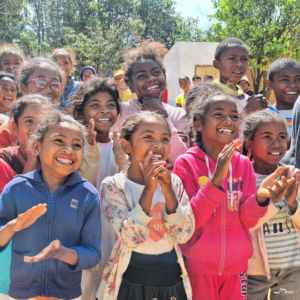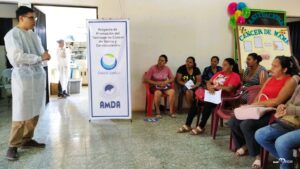Madagascar
Un rapport de M. RAVELOSAONA Ranto Arilala, Chargé de terrain, Bureau d’AMDA-MINDS à Madagascar
Un aperçu de nos activités à Madagascar
(Publié le : 14 mars 2025)
La majorité des écoles publiques à Madagascar souffre d’un manque d’infrastructures sanitaires adéquates. L’eau et les latrines sont souvent insuffisantes, mal entretenues ou inexistantes. Les enfants, en particulier les filles, peuvent être réticents à fréquenter l’école en l’absence de toilettes sures et propres. Parallèlement, l’insuffisance d’éducation et de sensibilisation sur les thématiques WASH (Water-Sanitation-Hygiene) engendre une augmentation des maladies liées à l’hygiène, un absentéisme accru, et une détérioration des conditions d’apprentissage, compromettant ainsi la santé et le bien-être des élèves. Le projet Felissimo vise à contribuer à remédier à cette situation en fournissant des installations sanitaires dignes et accessibles et aspire également à instaurer une véritable culture de santé et d’hygiène au sein des écoles primaires publiques à Miadanandriana.

L’une des activités amusantes : le théâtre de marionnettes. De manière accessible aux élèves plus jeunes, cela transmet l’importance de l’hygiène

Les enfants rient et apprennent, et voici leur expression!
Nepal
Mr. Pradip Raj Pant, Program Coordinator, Nepal Office
Breaking the Silence: Step towards a healthier, more informed community
Reproductive health problems are widely prevalent but highly stigmatized issue across Nepal, and Chure Rural Municipality is no exception. Last year alone, three cases of uterine prolapse, 82 cases of dysfunctional uterine bleeding (DUB), 69 cases of menstrual disorders and 162 cases of pelvic inflammatory diseases (PID) were reported in the rural municipality’s health facilities. However, these numbers only scratch the surface. As Assistant Health Coordinator Mr. Bikram Bohara aptly puts it, “Reproductive health problems in Chure are hidden problems.” Many women suffer in silence, constrained by societal stigma and a lack of awareness. This silent epidemic has created an urgent need for targeted interventions.
(Published on: October 24, 2024)
READ MORE >>>


Honduras
Dr. Dagoberto Mejía López, Coordinator, Honduras office
Uplifting Hope!
Dr. Dagoberto Mejía López, Coordinator from the Honduras office shares the latest updates on the 2024 Breast Cancer Awareness Month event.
(Published on: October 24, 2024)





